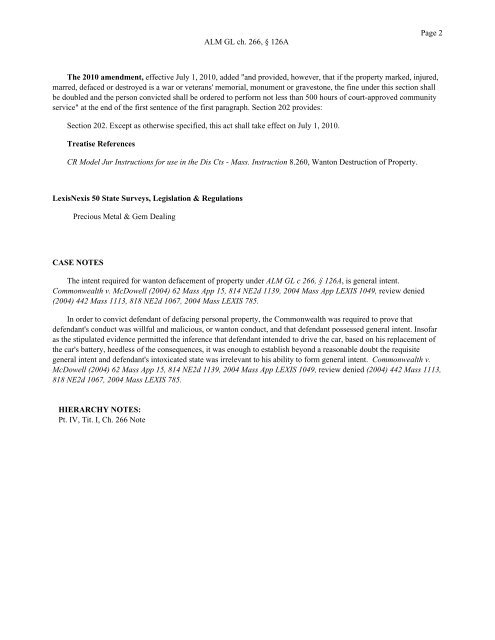1 of 15 DOCUMENTS ANNOTATED LAWS OF MASSACHUSETTS ...
1 of 15 DOCUMENTS ANNOTATED LAWS OF MASSACHUSETTS ...
1 of 15 DOCUMENTS ANNOTATED LAWS OF MASSACHUSETTS ...
Create successful ePaper yourself
Turn your PDF publications into a flip-book with our unique Google optimized e-Paper software.
ALM GL ch. 266, § 126A<br />
Page 2<br />
The 2010 amendment, effective July 1, 2010, added "and provided, however, that if the property marked, injured,<br />
marred, defaced or destroyed is a war or veterans' memorial, monument or gravestone, the fine under this section shall<br />
be doubled and the person convicted shall be ordered to perform not less than 500 hours <strong>of</strong> court-approved community<br />
service" at the end <strong>of</strong> the first sentence <strong>of</strong> the first paragraph. Section 202 provides:<br />
Section 202. Except as otherwise specified, this act shall take effect on July 1, 2010.<br />
Treatise References<br />
CR Model Jur Instructions for use in the Dis Cts - Mass. Instruction 8.260, Wanton Destruction <strong>of</strong> Property.<br />
LexisNexis 50 State Surveys, Legislation & Regulations<br />
Precious Metal & Gem Dealing<br />
CASE NOTES<br />
The intent required for wanton defacement <strong>of</strong> property under ALM GL c 266, § 126A, is general intent.<br />
Commonwealth v. McDowell (2004) 62 Mass App <strong>15</strong>, 814 NE2d 1139, 2004 Mass App LEXIS 1049, review denied<br />
(2004) 442 Mass 1113, 818 NE2d 1067, 2004 Mass LEXIS 785.<br />
In order to convict defendant <strong>of</strong> defacing personal property, the Commonwealth was required to prove that<br />
defendant's conduct was willful and malicious, or wanton conduct, and that defendant possessed general intent. Ins<strong>of</strong>ar<br />
as the stipulated evidence permitted the inference that defendant intended to drive the car, based on his replacement <strong>of</strong><br />
the car's battery, heedless <strong>of</strong> the consequences, it was enough to establish beyond a reasonable doubt the requisite<br />
general intent and defendant's intoxicated state was irrelevant to his ability to form general intent. Commonwealth v.<br />
McDowell (2004) 62 Mass App <strong>15</strong>, 814 NE2d 1139, 2004 Mass App LEXIS 1049, review denied (2004) 442 Mass 1113,<br />
818 NE2d 1067, 2004 Mass LEXIS 785.<br />
HIERARCHY NOTES:<br />
Pt. IV, Tit. I, Ch. 266 Note









